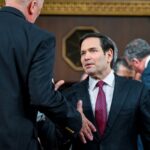

Anita Dunn has returned to the White House at a moment of uncertainty for President Joe Biden, helping to drive the administration’s message into the midterm elections, when voters will decide whether Democrats retain control of Congress.
But Dunn’s latest tenure has cast a spotlight on the administration’s promise to run the most upstanding White House in history, with ethics attorneys questioning a practice that allowed Biden’s senior adviser to skirt public disclosure rules.
During two earlier stints in the Biden White House, Dunn bypassed traditional disclosure obligations with a temporary role. As a “special government employee” making just below the $132,552 salary threshold for disclosure, Dunn’s status kept her client list private, along with a substantial asset portfolio.
Akin to a consultant, a so-called SGE generally holds the position for 130 days or less and is able to continue work for outside clients.
IRAN SOFTENS DEMAND ON MAJOR NUCLEAR DEAL STUMBLING BLOCK, US OFFICIAL SAYS
Dunn also did not have to sign Biden’s ethics pledge, which prohibits staff from working on public policy issues linked to their former employer or clients and mandates a cooling-off period for staffers leaving the administration.
After joining Biden’s administration as a senior adviser on Inauguration Day, Dunn returned to SKDK, the powerful consulting shop she co-founded, last year in August. She was back at 1600 Pennsylvania in March for a second temporary posting, in part filling in for Biden’s deputy chief of staff, who was out on personal leave, the Washington Post reported.
Dunn’s 93-page filing lists nearly 20 clients, including Pfizer, AT&T, Micron, American Clean Power Association, Lyft, Salesforce, Reddit, and Melinda French Gates’s company Pivotal Ventures, as well as an extensive investment portfolio. Her salary from SKDK, a major political vendor, was $738,715.
With her husband, Bob Bauer, White House counsel under former President Barack Obama, Dunn holds an asset portfolio ranging in value from $16.8 million to $48.2 million, according to an estimate by CNBC.
The White House said Dunn will divest her holdings and recuse herself from all matters involving SKDK and past clients. Dunn also won’t be able to join any meetings with those clients for two years, in line with the administration’s ethics pledge, White House spokesman Chris Meagher told CNBC. The White House did not respond to the Washington Examiner when asked whether Dunn had divested yet.
But the revolving-door appointments and delay in divesting pose concerns, said Walter Shaub, director of the Office of Government Ethics under Obama and briefly under former President Donald Trump.
“She joined the government in May. It’s now August. Why have three months gone by with these massive conflicts of interest?” Shaub said, noting that she likely held the same financial interests during her earlier stints.
Not until May did Dunn assume a position that required public disclosure of her financial assets and former clients, despite advising the president for many months. This was not the case for Biden’s other senior adviser, Mike Donilon, or past presidential senior advisers, including Karl Rove, David Axelrod, or Jared Kushner.
Her newly public filing details her work and asset holdings over the two years leading up to her appointment as assistant and senior adviser to the president in May.
While the practice follows the letter of the law, for a White House quick to tout its ethical bona fides, “It just seems really disingenuous to give someone that much authority, but set their pay below a level that would require financial disclosure,” Shaub said. “That creates the appearance that you’re just trying to avoid letting the public know what conflicts of interest a person has.”
Calling Dunn’s situation “deeply troubling,” Shaub said, “You can’t go around bragging, as this administration does, that they’re the most ethical administration in all of history when they’re only nearly, technically legally compliant in a lot of cases and instead approaching government ethics the way a tax attorney does when trying to save the client money — by looking for loopholes and exceptions,” he said.
The high-level temps that fill SGE roles have long come under fire.
Huma Abedin and Cheryl Mills, both close aides to former Secretary of State Hillary Clinton, held outside posts while serving in the Obama administration in temporary roles. During one four-month period, Mills served as Clinton’s unpaid chief of staff and top White House liaison while working part-time for New York University negotiating with Abu Dhabi to build a university campus in the city.
Abedin spent her final six-month stretch as Clinton’s deputy chief of staff in 2012 employed by the Clinton Foundation and the New York City-based advisory firm Teneo.
In her current post, Dunn is spearheading political strategy for the White House heading into the midterm elections, including messaging on the climate-focused reconciliation bill that the White House hopes will help propel Democrats through November.
In a memo co-authored with White House deputy chief of staff Jen O’Malley Dillon, Dunn detailed an aggressive push to tout the Biden administration’s policies with voters.
But the bill is in part a healthcare bill, and Dunn’s past work for Pfizer raises concerns, Jeff Hauser at the liberal Revolving Door Project believes.
“It is impossible for us to know to what extent she might be pulling punches,” Hauser said. “We don’t know, and it’s an apparent conflict of interest.”
The White House disputes this, with Meagher calling the suggestion that Dunn’s past client relationships could pose a potential conflict of interest “a fundamental misunderstanding of how the ethics pledge and recusals work.”
“Writing a broad messaging memo explaining a bill that has been signed into law is a lot different than communicating with or advocating for the former client,” Meagher said. “Anita has not, nor will she participate in any particular matter involving specific parties that is directly and substantially related to a former employer or former client they worked for.”
In addition to Pfizer, Dunn recently advised other firms that have benefited from the administration’s policies.
The chief executive of Micron, one of Dunn’s former clients, made the case before the U.S. government in March for increased federal subsidies to boost the semiconductor industry.
After the CHIPS and Science Act passed this month, Micron announced that it would invest $40 billion to manufacture semiconductor chips in the U.S., supported by the bill’s grants and credits.
Shaub said White House officials should be divesting right away to avoid even the appearance of conflicts.
“It may be legal, but the fact that there’s some nuanced technical legal explanation … does not make the public feel a whole lot better when somebody has a financial interest in the government policies they’re influencing and shaping,” he added.
CLICK HERE TO READ MORE FROM THE WASHINGTON EXAMINER
According to a report by Puck’s Tara Palmeri, some close to the White House have suggested that to avoid the “logistical headache” of the Biden administration’s divestment and disclosure rules, Dunn could instead “ascend to an almost Valerie Jarrett-like role, essentially the chairwoman to the chief of staff — offering wisdom to the president, to the COS, and presumably accruing her own value.”
But Hauser said that as consigliere to Biden, his concerns over Dunn’s clients would be elevated further.
“The higher the level, the more impossible it is to actually recuse yourself,” he charged. “There’s no way to make political strategy for Biden where you’re not taking a stance one way or another, implicitly or explicitly.”







